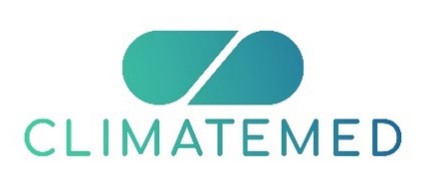Project ID
2021-2-HU01-KA220-HED-000050972
Project title
Developing new curriculum outlines and learning materials on climate change's health impacts for medical schools
Project manager, contact details
Göndöcsné Agócs Dóra; agocs.dora@pte.hu
Academic supervisor, contact details
Dr. Girán János; janos.giran@aok.pte.hu
Total project budget
361.979 EUR
Total budget of UP
85.267 EUR
Project start date
Project end date
Coordinator
University of Pecs (HU)


Partner Organisations
University College Cork (IE); Nemzeti Népegészségügyi Központ (HU); Centar za zdravlje, vezbanje i sportske nauke (CS); Universitatea de Medicina, Farmacie, Stiinte si Tehnologie George Emil Palade din Targu Mures (RO)
General description
A CLIMATEMED projekt célja: (1) új tananyag létrehozása az éghajlatváltozás egészségügyi hatásairól az orvosi egyetemek számára, különös tekintettel az e hatások megelőző intézkedéseire; (2) hogy támogassák az éghajlatváltozást és az egészségügyet mint horizontális prioritást az orvosi egyetemek tantervében Európa-szerte, biztosítva, hogy az oktatók tisztában legyenek a fogalommal, és megfelelő képzésben részesüljenek, és így biztosítva a helyét az orvosi egyetemek oktatásának élvonalában; (3) a gyakorló orvosok támogatása az éghajlatváltozás egészségügyi hatásaival kapcsolatos ismereteik bővítésében, különös tekintettel az e hatások elleni lehetséges megelőző intézkedésekre.
Program
Application monitoring
Project ID
2021-2-HU01-KA220-HED-000050972
Project title
Developing new curriculum outlines and learning materials on climate change's health impacts for medical schools
Project manager, contact details
Dóra Göndöcsné Agócs; agocs.dora@pte.hu
Academic supervisor, contact details
János Girán, Dr.; janos.giran@aok.pte.hu
Total project budget
361.979 EUR
Total budget of UP
85.267 EUR
Project start date
Project end date
Coordinator
University of Pecs (HU)


Partner Organisations
University College Cork (IE); Nemzeti Népegészségügyi Központ (HU); Centar za zdravlje, vezbanje i sportske nauke (CS); Universitatea de Medicina, Farmacie, Stiinte si Tehnologie George Emil Palade din Targu Mures (RO)
General description
Background:
Several studies suggest the next decade will be critical for immediate action to avoid "long-lasting and irreversible" risks to humans and ecosystems. According to WHO predictions, due to climate change's multifactorial health impacts, 250,000 additional deaths are estimated per year between 2030 – 2050. Moreover, the increased incidence of the recent infectious and chronic diseases and new ones' emergence is also expected. Consequently, climate change presents unprecedented health risks and requires urgent attention to address them. In addition, reducing climate change-related health risks contributes to achieving Goal 3 of the UN Sustainable Development Goals, namely to ensure healthy lives and promote well-being for all ages.
There is a general agreement that improving climate awareness and the knowledge related to climate change's health impacts are essential among medical students. In 2015, in the Health Educators Climate Commitment declaration, representatives of 118 universities from 15 countries expressed their commitment to ensuring the conditions that help future health professionals acquire the knowledge needed to control the health risks of climate change. In 2018, the Standing Committee of European Doctors, an organisation of European national health organisations, made a professional case to EU decision-makers to add “knowledge on the impacts of climate change” in the training of health professionals. Currently, in the curricula of most medical schools, the health-related impacts of climate change represent a peripheral part: according to a 2019 survey, only 15% of the 2,817 medical schools globally have a course that teaches climate change and health topics. In contrast, there is a growing demand from medical students that medical schools integrate climate change and health issues into curricula. Considering climate-change medicine is expected to emerge as a specialised medical activity shortly, it is necessary to begin preparing current medical students as soon as possible.
Climate change and all its impacts, including health impacts, are felt around the world. Consequently, it is a pressing challenge for all medical schools to tackle teaching on the health impacts of climate change. Clinicians accept that climate change increases health risks by placing extraordinary stresses on human health. People remain vulnerable to massive natural disasters that weaken individuals' and communities' resilience and adaptive capacity. Consequently, it is expected that the number of patients in national health systems will increase significantly due to the adverse effects of climate change.
The CLIMATEMED project, with its learning material development and training design activities, can strengthen the medical universities' capacities to ensure up-to-date knowledge of how climate change can endanger human health and how physicians can deal with these novel health challenges.
Objectives:
The purpose of the CLIMATEMED project is to: (1) create a new curriculum on climate change's health impacts for medical schools, with particular attention to the preventative measures of these impacts; (2) promote climate change and health as a horizontal priority in the curriculum of medical schools across Europe, ensuring academic staff are aware and trained in the concept, and thus securing its place at the forefront of medical school teaching; (3) support practising medical doctors to increase their knowledge of the health effects of climate change, with particular attention to the possible preventative measures against these impacts.
By achieving all these objectives, we want to emphasise the relevance of climate change-related health challenges and promote the introduction of education on the health effects of climate change in as many medical schools in the European Union as possible. The English, Hungarian and Romanian language versions will contribute to achieving this goal. Due to the language similarities, the Serbian version will contribute to supporting this aim in the Balkan region of Europe.
In addition, the CLIMATEMED project also aims to contribute to the attitude formation of current and future doctors. Doctors and other health professionals have a crucial role in shaping the public's attitudes to various health risks. We, therefore, aim to help professionals understand the importance of ever-changing environmental risk factors and communicate this to the public. All these tasks require medical students, as future doctors, to acquire adequate knowledge of the health impacts of climate change as part of their undergraduate training. To this end, medical school curricula should be developed to include climate change and its impact on health. It is also essential for practising doctors to be equipped with knowledge about climate change and health to improve the knowledge they have already acquired. The CLIMATEMED project intends to contribute to achieving these objectives.
Current academic staff also play a significant role in ensuring climate change-related health problems are integrated into medical schools' curricula. Therefore, we also want to achieve an attitude change among professors and lecturers. To this end, we are developing a training programme that will help put climate change and health into the focus of academic staff's attention and thus into the medical curricula as a horizontal priority.
All in all, our overall aim is to help fill the gap between the predicted demand for healthcare due to climate change and the current knowledge taught at medical school. In addition, developing our outputs will directly assist the universities participating in the CLIMATEMED project (UP, UCC, UMFST) to address this challenge and provide the material for all universities in the European Union and beyond to continue to deliver this much needed education in their medical curricula upon completion of CLIMATEMED.
Program
Application monitoring
